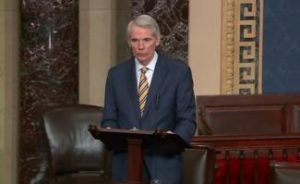
Chinese government-funded institutes located at more than 100 American colleges and universities could be negatively impacting the U.S. education system, U.S. Sen. Rob Portman (R-OH) said during a U.S. Senate subcommittee hearing last week.
“These institutions in America have received more than $158 million in support from the government of China for these Confucius Institutes since 2006,” said Sen. Portman, chairman of the U.S. Senate Homeland Security and Governmental Affairs Permanent Subcommittee on Investigations, referring to the enterprises that engage in teaching Chinese culture and language at universities and colleges around the world.
Sen. Portman said during the subcommittee’s Feb. 28 hearing that the Confucius Institutes are designed and primarily staffed by the Chinese government, which “bills them as an opportunity for cultural exchange and the funding comes from them.”
However, the senator said that while hosting such institutes is “an appealing prospect” for many U.S. schools trying to meet rising language instruction demands, “we need to be careful.”
During his almost 16-minutes of opening remarks, Sen. Portman called for more transparency in how these institutes operate in the United States and more reciprocity for the United States also to provide its cultural institutions in China.
“That is not happening now because China has systematically shut down comparable U.S. State Department public diplomacy efforts on college campuses in China,” he said. “There needs to be appropriate engagement without, in this case, the Chinese government determining what is said and what is done on U.S. campuses. And the law must be followed and that’s why transparency is important.”
The senator also highlighted a new 96-page bipartisan staff report, entitled “China’s Impact on the U.S. Education System,” that he released with U.S. Sen. Tom Carper (D-DE), ranking member of the Permanent Subcommittee on Investigations.
Sen. Portman said the report details the lack of transparency in how American colleges and universities manage Confucius Institutes and he added that both the report and the hearing follow an eight-month investigation into the issue.
“Our report details how China, known for its one-sided dealings in trade, not having a level playing field in trade also does not have a level playing field with regard to these cultural exchanges,” he said. “Our report documents how U.S. officials have expressed concerns about Chinese influence through these Confucius Institutes.”
Additionally, Sen. Portman discussed during the hearing the new commitments he received from the U.S. Department of Education to issue new guidance to the more than 3,000 schools it oversees to ensure schools know they’re obligated to report receiving these foreign government funding sources; and from the U.S. State Department to do more to ensure visas are being properly used at Confucius Institutes around the country.
The State Department has labeled Confucius Institutes as China’s most-prominent “soft power platform,” he said, and higher education groups also have expressed concerns, including the American Council of Education, the National Association of Scholars, and the American Association of University Professors.
And other foreign governments already have acted, added Sen. Portman, pointing to the U.K. Conservative Party Commission on Human Rights, which he said has called for a suspension of agreements until a more comprehensive review is completed of potential threats to academic freedom at the Confucius Institutes in the United Kingdom.
Likewise, the Canadian province of New Brunswick announced it would cease its Confucius Institutes operations citing academic freedom concerns, according to Sen. Portman, and the Australian state of South Wales currently is reviewing the Confucius Institute program.
“As with all of our investigations, we are developing legislation aimed at addressing the problems identified here today,” Sen. Portman said during the hearing. “Any legislation must try to anticipate the potential rebranding of Confucius Institutes or other efforts that may seek to avoid the transparency, the disclosure, and the reciprocity that is needed if these programs are to continue on our campuses.”



